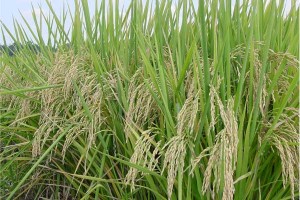Texas AgriLife Research, a division of Texas A&M University in College Station, is conducting research on sustainable techniques to improve yields of high-quality organic rice. The work led by Fugen Dou, a soil and crop science professor at AgriLife’s lab in Beaumont, is funded by two U.S. Department of Agriculture grants totaling $952,000 that run through 2015.
AgriLife says the U.S. devotes some 50,000 acres to organic rice each year, with demand increasing for the product. Dou notes that Texas “now has about 15,000 acres of organic rice and is revitalizing the rice industry.” Conventional rice production had been in decline in Texas over the past 15 years.
The team — with colleagues from Texas, Arkansas, and South Carolina — will address some of the gaps in knowledge about growing organic rice. Since most rice in the U.S. is grown in flooded rice paddies, organic production methods developed for other crops do not pertain to rice farming.
Among the outstanding questions, and the focus of the largest of the two USDA grants, is the ability to reduce greenhouse gas emissions in organic rice farming. “Organic rice farming may have greater potential for soil carbon sequestration,” says Dou, “but may also result in greater greenhouse gas emissions because of greater input of organic matter.”
The new study will also investigate techniques to increase organic rice yields and improve its milling quality. The project plans to look into the role of cover crops, organic soil amendments and the choice of varieties to improve soil quality, and reduce disease loss. In previous research, Dou found that ryegrass and clover performed better than other winter cover crops on clay soils. Dou’s earlier research showed as well that two organic soil additives — Nature Safe and Rhizogen — increased yield and milling quality better than other organic fertilizers.
In the new study, Dou plans to examine the way all of these factors work together. “With this research,” says Dou, “we will look at the effect of cover crops, organic soil amendments and the variety of rice on yield, milling quality, soil carbon sequestration and greenhouse gas emissions.” Related research, funded by a separate USDA grant, will investigate as well the severity of disease in rice crops in Texas and South Carolina, focusing on dissolved organic carbon, nitrogen, and phosphorous concentrations and salinity on water quality.
Read more:
- U.S.-India Partnership to Develop Long Shelf-Life Tomato
- International Consortium Studies Corn Genome
- USDA Funding Research to Aid Organic Dairy Farming
- Fewer Drug-Resistant Bacteria in New Organic Poultry Farms
* * *


 RSS - Posts
RSS - Posts
You must be logged in to post a comment.